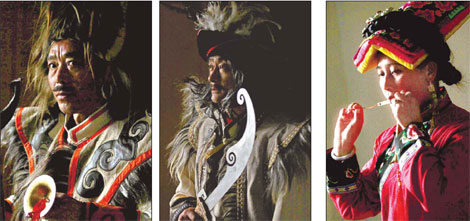Dancing to their own tune
The Qiang ethnic group was hard hit by the Sichuan earthquake but is now promoting its culture to lead a revival in its fortunes.
 |
|
The Qiang ethnic performers in their traditional costume. |
Traditional folk songs accompanied by digital music, rituals and dances by 120 colorfully dressed performers, comprise the show Soul of Qiang, which premiered earlier this month.
The song and dance show is intended to benefit earthquake-hit Maoxian county of Sichuan province in the same way that Kunming's Dynamic Yunnan and Chengdu's Jinsha have done. These large-scale shows focused attention on these areas and encouraged tourists to visit.
After its debut at the National Display of Minority Intangible Cultural Heritage in Beijing, the show will tour cities around the country, before settling in Maoxian at the Qiang Culture Industrial Park, to be completed by the end of this year.
"We hope tourists who go to Jiuzhaigou to appreciate its world-class natural beauty will also stay in Maoxian to experience unique Qiang culture," says Gao Jiajun, governor of the county.
The Qiang, who live mostly in the mountains of western Sichuan, are one of the least known of the 56 ethnic groups of China, but one of the most ancient peoples in Chinese history.
The Qiang have drawn much attention in recent years because their main bases are in Maoxian, Wenchuan and Beichuan - the worst hit areas of the May 12 earthquake of 2008.
The Qiang population numbered 306,072 in 2000, according to a national census conducted that year. Although the government did not publicize the ethnic identities of the earthquake victims, experts estimate that according to the percentage of Qiang people in the earthquake-hit areas, about 8 to 10 percent of the total Qiang population died in the calamity.
"The earthquake was also a crushing blow to Qiang culture. Traditional buildings toppled down, cultural relics were destroyed, and some masters of Qiang intangible cultural heritage died," says Gao, who lost two brothers-in-law in the earthquake.
Qiang culture was at risk before the quake, however. For instance, Gao is a Qiang man but cannot speak the language. He says that only one fourth of Qiang people in Maoxian can still speak the language.
"Many of the young performers in our group do not understand the lyrics of the songs that they sing in the show," says 71-year-old He Huakui, the eldest performer in Soul of Qiang. "For them, it is almost like singing foreign songs."
 0
0 







Go to Forum >>0 Comments